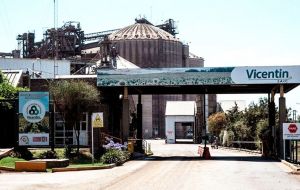MercoPress. South Atlantic News Agency
Argentina will take over soy-crushing giant, currently under administration
 President Fernandez said government will take control of Vicentin for the next 60 days as it seeks congressional approval to expropriate the agricultural powerhouse
President Fernandez said government will take control of Vicentin for the next 60 days as it seeks congressional approval to expropriate the agricultural powerhouse  YPF Agro would then absorb Vicentin entirely, creating a state commodities giant with major hands in shale drilling, fuel dispensing and crop trading
YPF Agro would then absorb Vicentin entirely, creating a state commodities giant with major hands in shale drilling, fuel dispensing and crop trading  The nationalization initiative apparently was drafted at the Patria think tank, which responds directly to vice president Cristina Kirchner
The nationalization initiative apparently was drafted at the Patria think tank, which responds directly to vice president Cristina Kirchner Argentine President Alberto Fernandez announced Monday evening a plan to seize crop trader Vicentin SAIC in a move that is anticipated will ring alarm bells in soy markets, among investors in the country and even the current foreign debt negotiations.
Vicentin is a family company with 90 years in the business, in the heart of the best farm land in the province of Santa Fe, and was currently under administration since the last quarter of 2019 after admitting a huge debt, mostly with government banks. Anyhow Vicentin is one of the four leading grains and oil seeds exporter of Argentina, and the only company totally Argentine.
However the surprise announcement of president Fernandez had immediate political and financial repercussions since the nationalization initiative apparently was drafted at the Patria think tank, which responds directly to vice president Cristina Kirchner, again opening the question as to who really governs in Argentina.
President Fernandez said the government will take control of Vicentin for the next 60 days as it seeks congressional approval to expropriate the agricultural powerhouse, and great supplier of the much needed hard currency a defaulted Argentina desperately needs.
Argentina exported US$ 12.2 billion in soy oil and soymeal last year. Soy-based livestock feed manufactured along the banks of the Parana River, Argentina’s grains superhighway, is used to fatten hogs and cattle from Europe to China, while soyoil is used in cooking and to make biofuels.
“I want to give peace of mind to all the workers of the company, who will continue in their jobs. And also to the 2,600 farmers who will be able to count on the company to buy their grains for processing and export,” Fernandez added.
”This is a statist vision for the 21st century,” Production Minister Matias Kulfas said in an interview late Monday after the announcement. The company wasn’t notified, he said, and apparently not even the Agriculture minister was aware of the initiative.
Under the plan, all of Vicentin’s assets -- the crown jewels of which are soy-processing plants that supply the world with meal for animal feed and cooking oil -- will be placed in a trust managed by the agriculture arm of state-run oil company YPF SA.
YPF Agro would then absorb Vicentin entirely, creating a state commodities giant with major hands in shale drilling, fuel dispensing and crop trading -- and even giving the government more clout in the currency market, Kulfas said.
The move comes at a delicate time for Argentina, which is negotiating a restructuring of US$ 65 billion in overseas debt. It also revives memories of the 2012 nationalization of YPF and other companies during the presidency of Cristina Kirchner, and raises questions about how Argentina will lure private-sector investments to lift its economy off the floor.
“History shows us that state interventions, in grain trading in particular, create severe distortions that end up deepening problems instead of solving them,” the Argentine Rural Society said in a statement.
The main opposition coalition rejected the measure, calling it “illegal and unconstitutional.”
The government contends that the repercussions of Vicentin’s financial crisis on Argentina’s farm industry were simply too big to ignore. The closely held firm is a major part of Argentina’s US$ 20 billion-a-year crop export business, accounting for 7.4 million metric tons of oilseed-crush exports in 2019.
“There’s a certain belief, especially among independent and small producers who have been quite damaged by Vicentin’s failure, that the company needed to be saved in some way,” said Juan Cruz Diaz, director of political consulting firm Cefeidas Group in Buenos Aires.
But to many observers, the nationalization points to another issue: Who exactly is governing Argentina? Fernandez, who’s far from a free-marketer but viewed as a moderate, or his deputy, Kirchner, a figurehead for fervent supporters of Latin American leftism, nationalism and a dominant role of the state in the management of the country's resources.
Vicentin’s fate has been closely tied to politics. The company grew strongly under free-market champion Mauricio Macri and then fell into disarray when Alberto Fernandez emerged as his likely replacement. Gabriel Delgado, an agriculture secretary under Kirchner, will lead the government’s intervention.
The company defaulted on about U$1.5 billion of debt last year. A court in Santa Fe province, where the company is headquartered, has been overseeing a bankruptcy in a procedure that’s similar to Chapter 11 in the U.S.
A big chunk of Vicentin’s debt is owed to state-run Banco Nacion. But the expropriation plan was still a surprise to company executives, who’ve been in talks with existing partner Glencore Plc and other companies, including YPF Agro, a spokesman said.
Switzerland-based Glencore has a joint venture with Vicentin called Renova, which includes one of the world’s biggest soy-crushing plants. Alberto Fernandez said it was too soon to say how a new state partnership with Glencore would work.
Argentina is the largest exporter of soy meal for animal feed and soy cooking oil, and in recent years Vicentin has fended off multinationals to have the top share of those shipments.
Another sin committed by the Vicentin group, which emerged during the debt refinancing process, was that they had contributed generously to ex president Mauricio Macri's failed reelection campaign, which is believed to have triggered the wrath of Cristina Fernandez.
Cristina Fernandez is a very intelligent woman but also very rancorous, and she never forgot the Argentine farmers strike in 2008 over levies on exports which almost forced her to resign, and also recalls that many farmers (those who could) would prefer to hold on to their crops, until they could have access to a more transparent foreign exchange market for the US dollar. Populist Cristina Fernandez favors strict controls and a multiple foreign exchange system.




Top Comments
Disclaimer & comment rules-

-

-

Read all commentsThere they go again ... what we all assumed and expected ... luckily millions of Argentines withdrew their funds in dollars from the banks as soon as Alberto Fernandez had won the PASO elections....
Jun 09th, 2020 - 03:07 pm +3That's right pgerman. Never keep you money in an Argentinean bank. Never get stuck with pesos. Can't buy USD, buy BTC.
Jun 09th, 2020 - 06:31 pm +2Pugol-H, Vicentin could turn into another “Aerolineas” which costs the taxpayers' a couple hundred millions a year to run.
Marti, I'll soon be fleeing to Uruguay.
Oh dear, backed Macri did they, that will have upset Cristina.
Jun 09th, 2020 - 05:34 pm +1This lot couldn’t run a piss up in a brewery and now they are going to run a large soy bean crushing business.
As part of their nationalised oil/gas business.
Instead of producing revenue, it will need subsidising.
Commenting for this story is now closed.
If you have a Facebook account, become a fan and comment on our Facebook Page!